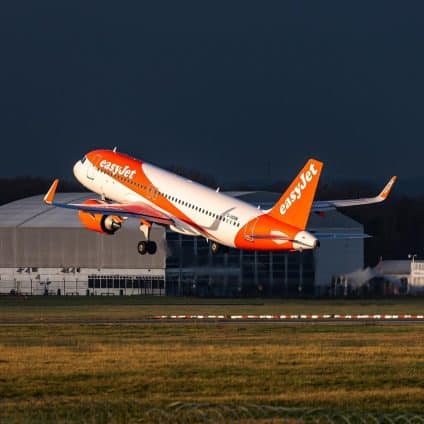Home » UK Business News • UK Employment news » EasyJet boss says travel sector better for summer but passengers face higher fees
EasyJet boss says travel sector better for summer but passengers face higher fees
https://www.whatjobs.com/news/united-kingdom/uk-business-news/easyjet-boss-says-travel-sector-better-for-summer-but-passengers-face-higher-fees

By Nagasunder in UK Business News, posted April 19, 2023

The boss of EasyJet says the travel sector is considerably better prepared for this summer than it was last year - but travellers are set to pay significantly more to get away.
The budget airline has raised its profit forecast for this year as summer bookings increased and passenger numbers recovered to pre-pandemic levels over Easter.
However, fares have risen considerably, but EasyJet boss Johan Lundgren defended the rise as being mostly driven by fuel costs.
He added it was equivalent to wider cost-of-living increases in supermarkets.
Read More: easyJet looking for over 45s to join cabin crew
He said it "remains to be seen" where demand will push fares in the summer, although revenue per seat, which primarily consists of fares, increased by 31 percent in the most recent quarter and is anticipated to be 20 percent higher than in 2022 until the end of June.
Lundgren described the recent £12 average rise as "a couple of coffees and a snack in an airport."
He said the airline has undertaken its largest-ever staff recruiting campaign, hiring over 3,000 workers in the previous year.
Read More: Christmas travel hit by new strikes as Border Force announce airport walkouts
He said: “We are fully recruited in terms of cabin crew and pilots but of course, the difficulty is that you will see weaknesses across the industry in other parts of the chain – but everybody is significantly better prepared than they were at this point last year,”.
“Strikes are likely to continue … what you have to do is be able to mitigate the impact” by having extra staff to help deal with delays and booking travellers on to other flights, he added.
In recent weeks, there have been strikes in several sectors across Europe, disrupting travel at German and French airports.
Read More: Travelodge hiring for more than 435 jobs across the UK
While Ryanair has blamed French air traffic control strikes for the cancellation of over 600,000 flights, Lundgren claims that easyJet's cancellations are a "quarter of that."
Despite the disruption caused by the strikes throughout April, passenger volumes over Easter were back to 2019 levels.
Airlines hope to avoid similar scenes to last summer when staff shortages caused large airport queues, delays, and the cancellation of tens of thousands of flights.
After governments lifted Covid-19 travel restrictions, the travel sector struggled to meet increased demand.
Read More: United Airlines pilots to get pay hikes as travel disruption continues
Since then, the industry has sprung up back, with people keen to travel again following Covid lockdowns and travel bans.
The cost-of-living crisis has not dented demand, Lundgren said. “While there is a squeeze on people’s incomes, people prioritise holidays and travel even more than they did before.
"This is driven by the fact that people are refocusing on experiences and doing things rather than investing in their homes, perhaps."
Read More: Airlines recruiting thousands of pilots as travel continues to increase after Covid
He said during the pandemic, many took extended vacations of up to 12 days, but that this has subsequently been reduced to seven days as patterns returned to normal.
Other alterations, however, have occurred: Mobile phones now account for 23 percent of bookings, up from 16 percent before the epidemic, and there has been a 10 percent increase in the amount of people paying extra to select their seats.
EasyJet expanded capacity by 40 percent from January to March and anticipates returning to pre-pandemic levels by the summer.
Its package holidays are 80 percent sold, and with strong UK demand, the company forecasts 60 percent year-on-year growth, up from 50 percent previously predicted.
Need Career Advice? Get employment skills advice at all levels of your career
Traditional beach destinations such as Málaga, Menorca, Faro, and Alicante are popular, as are city breaks like Amsterdam.
Despite a 71 percent increase in fuel costs, the airline expects to exceed analysts' projections of a £260 million profit this year. EasyJet made a £178 million pre-tax loss last year.
However, it is forecast to lose between £405 million and £425 million in the first half.
Lundgren declined to comment on a shareholder revolt at the airline's annual meeting in February, in which 20 percent opposed the compensation report, which included a hefty £3m bonus for the CEO.
Source: The Guardian
Follow us on YouTube, Twitter, LinkedIn, and Facebook














